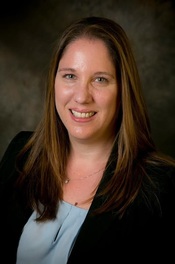|
By Heather Burkhart
I recently had the privilege of speaking with Dr. Gaia Vasiliver-Shamis, the Director of Career Development for Postdoctoral Fellows at Emory University School of Medicine, and what she likes to call a “non-practicing” scientist. She may not currently be doing her own research, but she hasn’t forgotten what it’s like. Her dedication to helping scientists everywhere succeed is a true inspiration to all of us who wish to make the world a better place; and not only that, but the very assistance she gives others in turn creates the possibility for scientists to get out there and do what they’re meant to do and improve the world themselves. We all know what is said about karma, but she can nevertheless be perfectly lovely at times.
When did your interest in science begin? My interest in science started at a very young age. As long as I can remember myself, I was always interested in science. I come from a family of civil engineers and architects, so this may have played a role in enticing my interest in STEM in general. I’m not sure what sparked my specific interest in life science—maybe part of it was me spending summer camps at the Weizmann institute (my grandfather worked there, though he wasn’t a scientist)—but I was always fascinated by biological systems and how they work. Throughout my school years I took science courses, including during summer vacations (yes, I can be a real nerd) in biology, microbiology, anatomy and more. These courses really deepened my interest and passion for life science, as they had a lot of hands-on components. How did the decision to pursue science affect other choices in your life, if any? My love for science affected many of my life choices. This might be a great example: I started my undergrad studies in industrial and management engineering, thinking I’ll then be an industrial and management engineer in a pharmaceutical company. After realizing that I enjoyed more talking with my friend in biotechnology engineering about what she studies, rather than the courses I was taking, I decided to change my course of study to biotech engineering. From then on, I continued with my studies to obtain my PhD in Immunology (NYU) and a postdoctoral fellowship at the National Institutes of Health (NIH). Regarding your course of study, research and employment, did you sort of fall into your work, or did you always know what you were going to do? That’s a great question. The answer is yes and no. It might sound like a cliché, but I truly believe everything happens for a reason. With my story above about switching majors after my first year, the friend who contributed to me switching—I met her a couple of months before starting college when I took a diving course. If I haven’t met her…would I be an industrial and management engineer today? Who knows! Having said that, it’s not all luck. You need to create the right environment or connections for things to happen and then keep an open mind and be ready to take on different opportunities. When I was going through acquiring my education, planning ahead was easy—I knew that after my undergrad, I’ll continue to grad school and then to a postdoctoral fellowship. However, toward the end of my PhD, I was starting to question whether I’d like to be a PI, but I still chose to continue for postdoc. When my postdoc advisor asked me what my long-term goals were during my one-year annual review, I was honest and shared with him that I didn’t want to become a PI. Funny enough, he mentioned they had an opening for a program manager and suggested I apply. So while on the one hand, I ended up “falling into” the program-manager position, on the other hand, it wasn’t completely out of the blue as my postdoc advisor knew I was involved in the fellows committee, and I’ve contributed to the lab in ways that weren't just science. I ended up in my current position in a similar way. I think it’s a matter of knowing what you enjoy doing and what your interests and values are, and if you find work where all these things intersect, you’ll be happy and satisfied. What is your current work/research focused on? I call myself a “non-practicing” scientist. When I did research, I was in the field of immunology, studying T cell signaling, and then for my postdoc I studied how mast cells and T cells interact with each other. In my current work as the Director of Career Development for Postdoctoral fellows at Emory University School of Medicine (Atlanta), I’m responsible for the professional development of 600-700 postdocs, helping them prepare for their next step. I truly enjoy working with postdocs one-on-one and supporting them; it is very gratifying to see them succeed. What made you decide to start up Scizzle? When I was doing research, I also had this nagging feeling that I needed to read more and check the literature more often. This became more prominent after I had my son during my third year in grad school. I did what most scientists do: subscribe by email to every relevant electronic Table of Content and do your best to actually go through them when you get 5-10 of those every week. I also relied on my colleagues and journal clubs to learn about the latest. With a new paper published every 20 seconds, it becomes almost impossible to keep up with the literature. For my PhD, I had to keep up with HIV, cell biology, cutting-edge microscopy and immunology just for my own project. Even after I left science and became a program manager at the NIH, I had to keep up with what faculty in my institute published, and it was always such a mundane task! I’m also a sucker for efficiency so I wished for a tool that would allow me to do this in an efficient and pleasant way (usually, things for scientists are very stale and boring in terms of user experience and design). A couple of years ago, we relocated from Washington, D.C., to Atlanta for my husband’s job. I then switched to working remotely and part time for the NIH. So in my spare time, I decided to try and make my idea a reality but didn’t know where to start. I started talking with friends who were successful entrepreneurs, and learned about a book called The Lean Startup by Eric Reis. It basically discussed how instead of spending time and money to build something and then realize no one needs it, you should make hypotheses and test them and keep iterating so you can actually build something of value. As a scientist, the hypothesis-driven testing was easy to resonate with. I was also fortunate to find some great mentors who supported me and taught me a lot. After I interviewed more than 150 scientists and 95 percent of the time heard a sigh every time I asked “How do you keep up with the literature?” I decided the idea of Scizzle was worth pursuing. How has it helped define your approach to science and reaching audiences? Being a solo-founder and self-funding Scizzle, I had to be resourceful and be able to make the most of my very limited resources. This makes you really agile and adaptable. I had to be able to communicate the idea of Scizzle to a variety of audiences. Needing to communicate it to users, developers and potential investors forced me to think first about the value Scizzle brings to each of those audiences. Often I had to communicate it within 2-3 minutes, so if you want to get your message across in a short time, you must be an effective communicator. Since the idea of Scizzle was to help researchers keep up with everything that is “sizzling hot in science,” we started a blog to accompany Scizzle. The Scizzle Blog is wonderful on multiple levels: First, it gives grad students and postdocs a great opportunity to gain non-academic writing experience and sharpen it (which is great for me as I’m passionate about career development for trainees); second, it allowed us to create valuable content. While we started with science, we expanded to other content such as science policy, topics in scientific training and some fun content too (we had a whole series about the science of Star Wars for May 4). We managed to successfully use the Scizzle Blog and social media to have a global reach with Scizzle. I learned a lot during this process about online marketing and science communications. One of the reasons I chose biomedical research is because I wanted to, naively as it may sound, improve people's lives. When you do basic research like I did, at some point you might feel the further you progress, the smaller and smaller your niche becomes, and there’s a big distance between what you do and actually helping someone. Working on Scizzle and helping scientists save valuable time by making information more readily available—so they can spend more time on research—made me feel like I’m reaching a larger audience than what I could have done as a researcher and potentially have a bigger impact. What do you hope to accomplish with it, and how have its successes manifested themselves? I want to keep growing Scizzle and its blog; now we’re at a point that our number of users has outgrown the code, and we need to do some major fixes. Since Scizzle is self-funded, in order to grow it we’ll need to figure out how it can sustain itself. It’s sort of like my baby, but there are some tough decisions that I need to make soon. What do you love most about what you do? How do you encourage other young girls to explore science and accomplish their goals? I love that what I do impacts people's lives and makes them better. Having a son and a daughter, I am very aware of how society sends mixed messages to girls. As both of my kids love science (not surprising I guess…) and are very inquisitive, if they ever say things like “this is for boys” or “girls don’t like something,” I will always stress that it doesn’t matter whether you’re a boy or a girl, you can do whatever it is that’s interesting to you. I do my best to encourage them equally to keep exploring, set goals for themselves and know that there will be setbacks and even failures, but they should always learn from them and move on to reach their goals. 
About the Author
Heather Burkhart is an energetic science writer and recent graduate from the linguistics program at the University of Utah where she developed an interest in studying aphasia and other language properties of the brain. She is currently Co-Managing Editor for The Scientista Foundation, and editor for its Scientista Spotlight section. When she is not writing in a cozy corner of her home, she is most likely exploring the beautiful outdoor landscape of Utah. Comments? Leave them below!
0 Comments
Leave a Reply. |
SPOTLIGHTSMeet our Scientista Spotlights -- current-day women in STEM and women from science history -- and find your role model! Read opinion editorials and history pieces to get additional inspiration.
WHAT'S NEWYOU MIGHT ALSO LIKE
WHAT'S HOTCONNECT WITH USARCHIVES
June 2018
|
The Scientista Foundation, Inc. All Rights Reserved © 2011-2021 | Based in NY | contact@scientistafoundation.org
The Network for Pre-Professional Women in Science and Engineering
The Scientista Foundation is a registered 501(c)(3) -- Donate!
The Network for Pre-Professional Women in Science and Engineering
The Scientista Foundation is a registered 501(c)(3) -- Donate!










 RSS Feed
RSS Feed